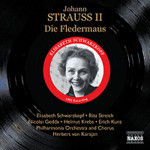
Die Fledermaus (The Bat) (rec 1955)
 $28.00
Out of Stock
$28.00
Out of Stock6+ weeks add to cart
JOHANN STRAUSS II
Die Fledermaus (The Bat) (rec 1955)
Elisabeth Schwarzkopf (Soprano), Nicolai Gedda (Tenor) / Philharmonia Orchestra & Chorus, Herbert von Karajan
[ Naxos Historical Great Operas / 2 CD ]
Release Date: Thursday 11 May 2006
This item is currently out of stock. It may take 6 or more weeks to obtain from when you place your order as this is a specialist product.
Historical 1955 recording of Die Fledermaus with Schwarzkopf, Gedda, and Karajan.
The first complete recording of Die Fledermaus was made under Bruno Seidler-Winkler in Berlin in 1907. In 1928 an electrically recorded abridged version appeared under Hans Weigert but it was not until September 1950 that another complete studio recording was made, this time in Vienna under Clemens Krauss, a very last-minute replacement for an ailing Josef Krips. This justly famous set sadly omitted any dialogue. For this recording the text was suitably edited by its producer, Walter Legge (1906-1979).
The year 1954 saw the introduction of experimental binaural or stereo recording. In the United States RCA had begun in December 1953 and by the latter part of the following year were using the new system in parallel with the established single channel or mono sound. In Europe Decca began recording with the binaural system in May 1954 and during July and August had even recorded three complete operas in Rome. EMI followed in February 1955 with orchestral recording and by early April Elisabeth Schwarzkopf and Walter Gieseking recorded a collection of Mozart songs, produced by her husband Walter Legge. One might then ask why Legge did not make use of this new system for the recording of Die Fledermaus later that month. The problem lay with the producer himself, who quite failed to recognise the great advance in recorded sound that stereo gave and would continue to give. He saw the new system simply in terms of channel separation, not as an overall balanced and homogenised quality of sound with both width and depth. It was without doubt Walter Legge's gravest artistic misjudgement, one that would cost his recording company dearly in the next few years. The use of stereo sound would indeed have have greatly enhanced the impact of this recording of Die Fledermaus.
The rôle of Rosalinde is sung by the German soprano Elisabeth Schwarzkopf (b. 1915). She studied at the Berlin Hochschule für Musik and later with the soprano Maria Ivogün, making her début as one of the Flowermaidens in Parsifal with the Städtische Oper, Berlin in 1938. Originally a lyrical soprano she undertook rôles such as Adele in Die Fledermaus, Musetta in La Bohème and Zerbinetta in Ariadne auf Naxos when she joined the Vienna State Opera under Karl Böhm in 1943. Her first overseas appearance was with this company on their visit to London in 1947, when she sang Donna Elvira, and Marzelline in Fidelio. She then joined the fledgling permanent Covent Garden Company, where for five seasons she sang a variety of rôles, mostly in English. Alongside these appearances, Schwarzkopf sang at the Salzburg Festival (1946-1964), La Scala, Milan (1948-1963), San Francisco (1955- 1964) and, finally, the Metropolitan in New York in 1964. She was greatly admired in the rôles of the Marschallin, Fiordiligi, Donna Elvira, and the Countess in Le nozze di Figaro. She also had a distinguished parallel career as a Lieder singer in the concert hall. She was the wife of the impresario and recording producer Walter Legge, whom she married in 1953.
The rôle of Eisenstein is taken by the Swedish tenor Nicolai Gedda (b. 1925). His versatility has always been considered remarkable in that he has sung in and can speak seven languages. Born in Stockholm of a Russian father and Swedish mother, he was trained at his native Royal Academy of Music. Making his début in 1951, he soon aroused international interest with his performance of Chapelou in Adam's Le postillon de Longjumeau. He first appeared at La Scala in Milan in 1953, quickly followed by engagements in Paris, London and New York. He created and later recorded the rôle of Anatol in Samuel Barber's Vanessa in 1958. He re-appeared in London in 1966, 1969 and 1976 but did not make his solo début until the age of sixty. Gedda sang at the Metropolitan in New York over 22 seasons in almost three hundred performances. His professional longevity was remarkable in that he was still recording as recently as 2002. His discography covers every aspect of the repertory.
Tracks:
Die Fledermaus (The Bat)
Die Fledermaus, Act I: Mein Herr, was dachten Sie von mir (Rosalinde)
Die Fledermaus, Act I: Overture (arr. E. Korngold)
Die Fledermaus, Act II: Herr Chevalier, ich grusse Sie! - Genug, damit, genug!
Die Fledermaus, Act II: Klange der Heimat (Rosalinda)
Die Fledermaus, Act II: Mein Herr Marquis (Adele)
Die Fledermaus, Act III: Spiel’ ich die Unschuld vom Lande (Adele)
![Eine Nacht in Venedig [A Night in Venice] (complete operetta recorded in 1954) cover](https://images.marbecks.co.nz/_thumbnails/10129/10129328.jpg)
![Wiener Blut [Vienna Blood] (complete operetta recorded in 1954) cover](https://images.marbecks.co.nz/_thumbnails/10129/10129819.jpg)

